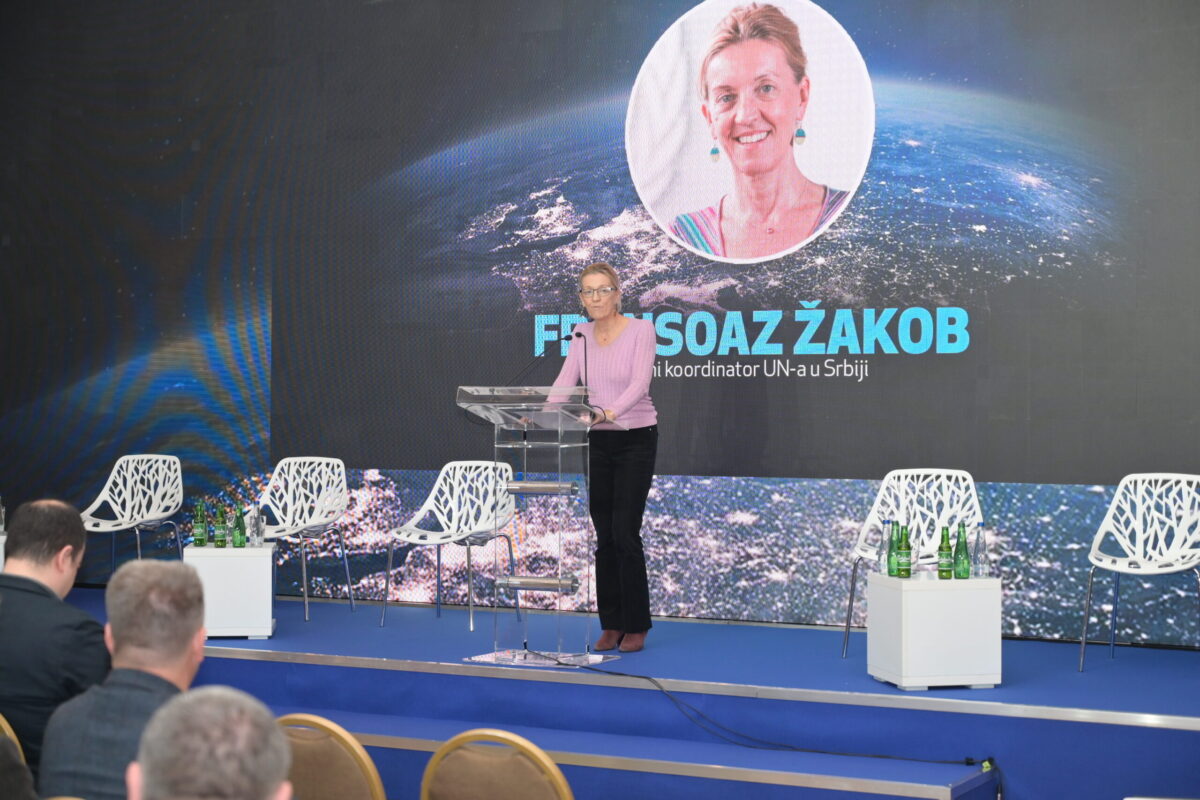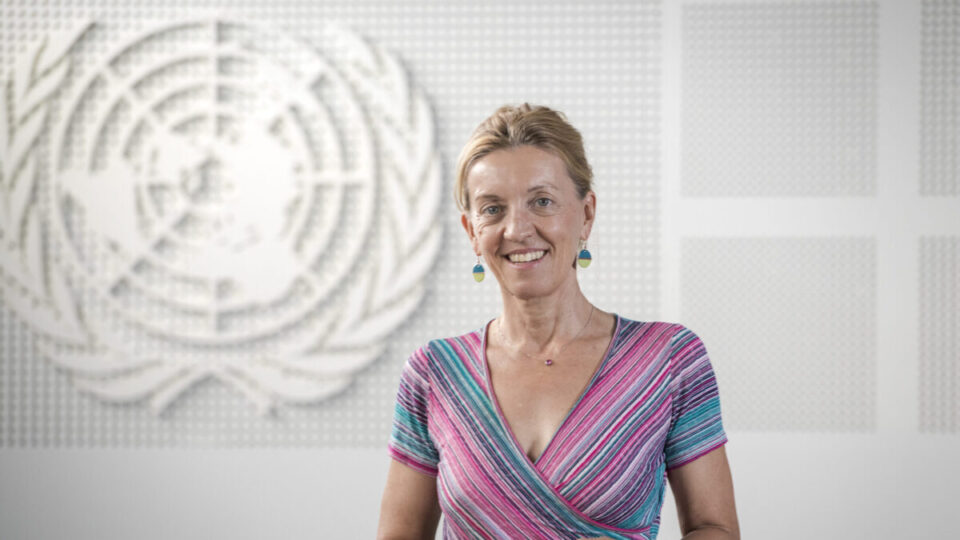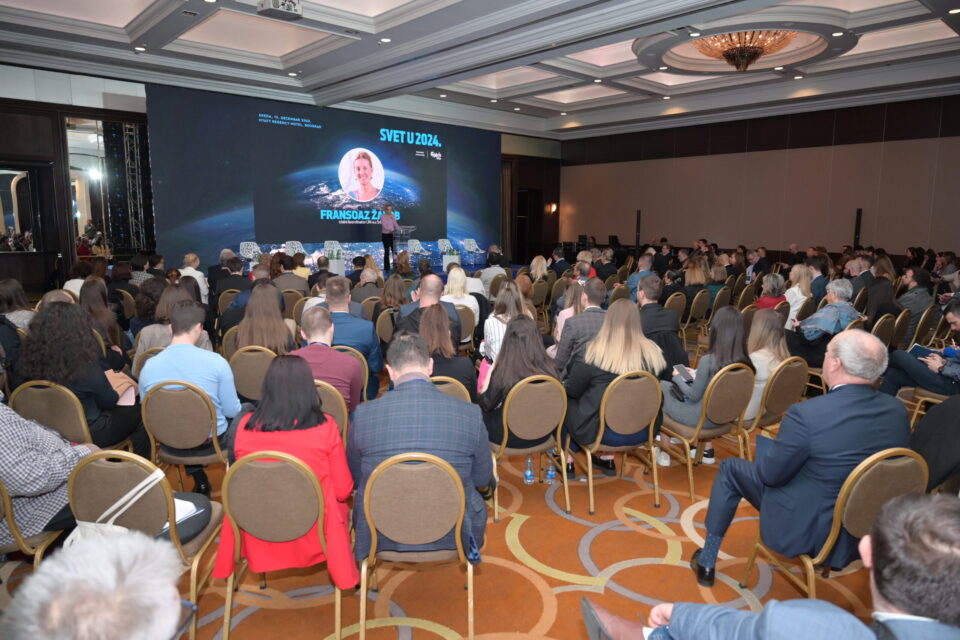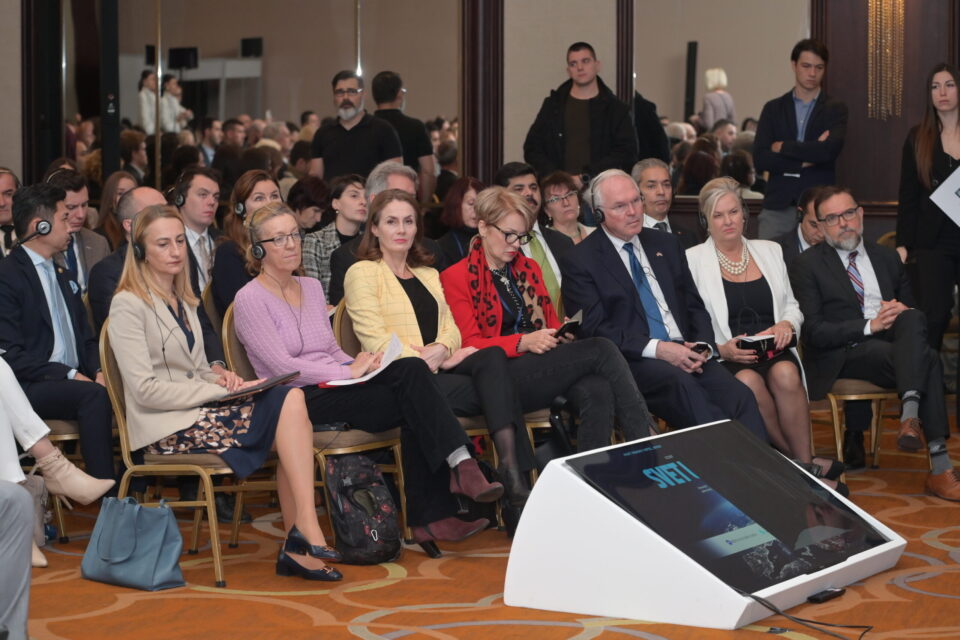New commitments for Serbia, the UN and the whole world
 As the world is ready to enter a new year, there have been more and more pressing questions and issues that require worldwide attention. Francoise Jacob, the UN Resident Coordinator in Serbia, addressed these questions in her speech at the „Svet u 2024“ conference, starting from climate change and actions that need to be taken to prevent further pollution, to education, digitalization and most importantly, peace building.
As the world is ready to enter a new year, there have been more and more pressing questions and issues that require worldwide attention. Francoise Jacob, the UN Resident Coordinator in Serbia, addressed these questions in her speech at the „Svet u 2024“ conference, starting from climate change and actions that need to be taken to prevent further pollution, to education, digitalization and most importantly, peace building.
Her speech started with reflecting on positive news about the new declaration that came into fruition as the conclusion of the latest COP28 conference: “I will start with the big piece of news of the day. It’s global news and it’s rather good news. COP28 has concluded today with a declaration that does include, formally and for the first time, transition out of fossil fuel. So it’s not phasing out, but transition. Certainly, we already know that we will spend the next year lobbying for a formal phase-out declaration. Climate change will work hand in hand with peace in the coming years. I like to say that the work of all the ministers that have talked before me will actually be influenced by how we treat climate change. It’s important that we keep this as our guiding framework and certainly it will be a guiding framework for UNs work in Serbia, along with the sustainable development goals.”
 On the other hand, she highlighted that Serbia has agreed to firmly re-commit to the Agenda 2030: “I want to mention that at the last general assembly in September, Serbia did re-commit to Agenda 2030. It was one of 32 countries that made a formal commitment and expressed a number of priorities. I want to mention that these priorities were shaped around six transitions and they will be our top priorities for 2024”
On the other hand, she highlighted that Serbia has agreed to firmly re-commit to the Agenda 2030: “I want to mention that at the last general assembly in September, Serbia did re-commit to Agenda 2030. It was one of 32 countries that made a formal commitment and expressed a number of priorities. I want to mention that these priorities were shaped around six transitions and they will be our top priorities for 2024”
The UN Resident Coordinator in Serbia emphasized that these six transitions will be at the core of UNs efforts in the next year: “The first one is the energy transition and everyone, including Serbia, will be involved. In the past few days, Serbia has committed to a number of pledges at COP28. I will list two of them. That is the global renewable and energy efficiency pledge. This is a commitment to triple the renewable energy generation and double the annual rate of energy efficiency by 2030 so this represents a huge commitment from 67 countries including Serbia, which is a huge opportunity for business as well. The second pledge that Serbia signed on is the global cooling pledge. This is about reducing cooling related emissions across all sectors by 70% by 2030. Again, an important commitment from Serbia.”
Prevention of conflict and preservation of peace should be a universal goal for any country, not just for those experiencing conflict
Francoise Jacob also touched upon the importance of sustainable food systems and integrating them into all national adaptation plans and long term strategies: “The second transition that we will work on is the sustainable food system. Again, at the COP28 Serbia has signed the declaration on agriculture, food and climate which aim to integrate agriculture and food system into all national adaptation plans, into the national determined commitment, the NDCs, into long term strategies, into national biodiversity strategies and action plans by 2030. For many of us in the room here this is an important commitment on food systems.”
 As one of the main topics, not just within the UNs agenda, but also as an important global issue that requires special attention, she talked about the need to tackle the problem of worldwide pollution: “The third transition is on pollution and loss of biodiversity. For the next three years, Serbia will chair the Carpathian Convention on biodiversity and sustainable development and we really hope this will contribute to accelerating the work on restoring biodiversity and addressing pollution.”
As one of the main topics, not just within the UNs agenda, but also as an important global issue that requires special attention, she talked about the need to tackle the problem of worldwide pollution: “The third transition is on pollution and loss of biodiversity. For the next three years, Serbia will chair the Carpathian Convention on biodiversity and sustainable development and we really hope this will contribute to accelerating the work on restoring biodiversity and addressing pollution.”
There have been transitions in which Serbia excels, according to Francoise Jacob, especially in the field of digitalization. She elaborated that the main goal of this transition is to help marginalized and diverse groups of people: „The fourth pillar of our work will be digital transformation and here I will mention that Serbia is trailblazing as a country in digital transition. The purpose of the UN here is really to focus on vulnerable group, marginalized groups, such as the elderly or young people and others. To support the digital transformation in the context of the need for these different groups.
The fifth transition, according to Francoise Jacob, will focus on social protection and jobs, while the sixth and final transition will be about transforming education.
Serbia is trailblazing as a country in digital transition
Francoise Jacob also swayed everyone’s attention to the needs of refuges and the protection that they require in order to live a normal and secure life: “Addressing the need of refugees and supporting the protection approach to migrants will remain a very important piece of our work. There are many stakeholders in Serbia, many resources, capacities, financial resources. I just want to highlight here that the niche for the UN in a country like Serbia, in an upper-middle income country, is first and foremost to address inequalities and leave no one behind. I hope you all know that the „leave no one behind“ principle is at the core of the agenda for 2030 and for us this means finding and shaping solutions for the most vulnerable. This is a country that has developed a tool and I’m looking at the former minister who was key in developing this tool that is called the „Leave no one behind“ tool. It is supposed to be mainstream through all the laws, through all the strategies, to make sure that the specific parameters and needs of vulnerable and marginalized groups are addressed. One of our success under UN is to have introduced the concept of the just transition, in the context of the green transformation, in the context of the energy transition. So I really hope that this is something many of you will help us focus on in the coming years.”
Taking into consideration conflicts taking place all around the world, the need for peace has been a big topic in the global public discourse. Francoise Jacob took a moment to talk about the importance and necessity of peacebuilding: “I know it is hard to talk about peace, but we must talk about it. I will just highlight three components of this agenda for peace which I think are very relevant to Serbia and the region. Number one is the need to build trust, solidarity and accountability. This is a social contract between the state and citizens and I hope this will be at the core of the work of the upcoming cabinet, mayors and MPs that will be elected. The second part is prevention. Prevention of conflict, preservation of peace should be a universal goal for any country, not just for those experiencing conflict. The consequences of conflict reverberate beyond national borders and prevention does not only to conflict affected countries. All countries need to recognize and commit to preventing and sustaining peace and develop national and regional prevention strategies, reframing prevention as a national agenda. This is a call from the UN to make sure that all the upcoming leaders will take peace as one of their core agendas, along with the human rights agenda.”
Finally, The UN Resident Coordinator in Serbia announced future plans for the UN and Serbia. She spoke about the concertations that will be taking place in Serbia within the Summit of the future: “In 2024 the UN will have the Summit of the future in September and we expect that there will be multiple national and local concertations here in Serbia, to not only inform the summit of the future, but also to look at the concertations with all sorts of groups, young people, different minorities, people in the rural areas. To talk to them and hear what their hopes and expectations are and how can we build and co-create the future together. This is something the UN will certainly support.”
